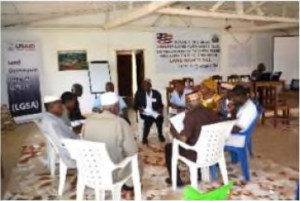
The newly established Liberia Land Authority (LLA), through the support of the United States Agency for Development (USAID) funded Land Governance Support Activity (LGSA) held a series of consultative meetings with traditional leaders, civil society organizations and professional bodies to discuss the proposed Land Rights Law currently before the Legislature.
In outlining the objectives of the consultations, Chairman of the LLA, Dr. Cecil T.O. Brandy, laid out for stakeholders the outstanding obstacles challenging the passage of the Land Rights Bill. Particularly contentious were the 1) 99-year grace period before the transfer of customary land and 2) maximum amount of 150 acres of land that can be owned in customary area.
“We want to discuss these issues with you and know your mind and recommendations so that we can forward them to the legislature,” he added. Facilitating the discussions were human rights lawyer, Cllr Tiawan Gongloe; Commissioner Designate, Atty. J. Adams Manobah; and Dr. Brandy.
The meeting in Gbarnga brought together paramount chiefs and other traditional leaders from all 15 countries of Liberia. Bong Country Superintendent, Hon. Selina Mappy, expressed how grateful she was that her country was selected to host such a historic meeting while recognizing the long distances traveled by many participants.
Dr. Brandy further welcomed the stakeholders to what he termed a new institutional framework: moving from the Land Commission to the Interim Land Task Force and now the Land Authority.
At another meeting in Monrovia, consisting of representatives from legal and professional bodies, on January 31, 2017, the President of the Liberia National Bar Association (LNBA), Cllr. G. Moses Paeger, raised concerns over future reviews of existing concession agreements, future new concessions, and the role of communities in the negotiation processes.
Another issue that came to light during these consultations was in reference to the tribal certificates that are not yet deeded and are to be issued by chiefs and elders, many of whom do not know what an acre is or how to measure land in in order to accurately allocate it.
In troubleshooting this issue, stakeholders called on the government to ensure that all tribal certificates are deeded to avoid future conflicts. Land Authority representatives were highly receptive to this and other feedback, which demonstrates the merit of having such consultations.

